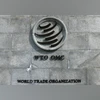Developed members must abandon higher moral ground: India at WTO agri meet
The Ministerial Conference is the highest decision-making body of the WTO. It is scheduled to meet in Abu Dhabi in February next year
)
World Trade Organisation (Photo: Reuters)
Listen to This Article
India on Thursday told WTO members that its success in feeding a large population demonstrates the country's understanding of what is best for developing nations at the negotiation table, an official said.
The observations were made at an agriculture negotiation meeting in Geneva, chaired by Ambassador Alparslan Acarsoy of Trkiye.
It is time for some developed members to abandon the higher moral ground, the Geneva-based official said.
In recent negotiations, India, along with 80 World Trade Organization (WTO) members, has made it clear that the focus of the outcome on agriculture at the 13th Ministerial Conference (MC13) in February 2024 should centre around a food security package, with a solution for public stockholding at its core.
The Ministerial Conference is the highest decision-making body of the WTO. It is scheduled to meet in Abu Dhabi in February next year.
Also Read
India has stated that this solution should provide developing members with sufficient flexibility to purchase food stocks at market support prices, they said.
During the meeting, the Chair called on members to consider the textual suggestions related to one element of public stockholding -- notifications and transparency -- with the aim of facilitating entry into text-based negotiations.
"India supported the Chair's approach to initiate discussions element by element and suggested incorporating additional elements in the future, such as the external reference prices (ERPs) used to assess the amount of stocks, currently based on prices from 1986-1988," the official said.
New Delhi also said it has never been a wheat importer but managed to provide its neighbours with around 200 tonnes of wheat in 2020-2021 during the pandemic.
"It asserted that public stockholding cannot be discussed in isolation from food security, stating that there is no evidence from challengers that India's wheat exports were either harming the food security of other countries or distorting trade," the official said.
India also asked some members to set aside the "arrogance" by denying India's way of contributing to food security in its own country and others, the official said.
India said, "Gone are the days when we were the discipline taker and we had no knowledge and wisdom to talk about a subject that concerns us. (The days when some said) You are not good enough to think good about yourself have gone and (that mindset) will come in the way of the success of MC13," according to the official.
The green box subsidies, promoted by some members as an alternative to public stockholding, did not work for everyone, India rebutted, adding that this is precisely why ministers reached an interim solution on public stockholding in Bali, the official added.
India argued that if challengers were genuinely concerned about transparency, they should discuss how to update the ERPs.
These ERPs are crucial for negotiation as they will determine whether payments on stocks constitute subsidies.
(Only the headline and picture of this report may have been reworked by the Business Standard staff; the rest of the content is auto-generated from a syndicated feed.)
More From This Section
Don't miss the most important news and views of the day. Get them on our Telegram channel
First Published: Oct 19 2023 | 11:22 PM IST


